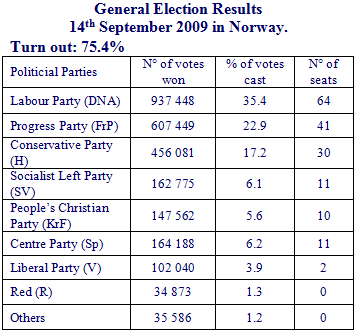News
Corinne Deloy,
Fondation Robert Schuman,
Helen Levy
-

Available versions :
EN

Corinne Deloy
Fondation Robert Schuman
Helen Levy
The outgoing coalition rallying the Labour Party (DNA) led by outgoing Prime Minister Jens Stoltenberg, the Centre Party (Sp) and the Socialist Left Party (SV) won the absolute majority in the general elections in Norway on 13th and 14th September 2009. Together the 3 parties won 47.7% of the vote and 86 of the 169 seats in the Storting (Parliament), ie -1 in comparison with the previous election on 12th September 2005 but their seats represent +1 seats in terms of the absolute majority.
The Labour Party improved its score of 4 years ago by winning 35.4% of the vote (64 seats +3). The Left Socialist Party, led by outgoing Finance Minister Kristin Halvorsen lost 4 seats (6.1%, 11 seats) whilst the Centre Party chaired by Liv Signe Navarsete remained stable (6.2%, 11 seats).
As for the opposition the populist, far right Progress Party led by Siv Jensen came 2nd and won 22.9% of the vote (41 seats +3) ahead of the Conservative Party led by former Local Affairs Minister Erna Solberg which recorded sound progress: 17.2% of the vote (30 seats +7). The People's Christian Party led by Dagfinn Hoybraten remained stable (5.6% of the vote and 10 seats, -1) whilst the Liberal Party which is firmly against any cooperation with the Progress Party fell below the 4% threshold (3.9% and 2 seats, -8). Its chairman, former Agriculture Minister Lars Sponheim announced that he would soon resign from the party.
Turn out rose to 75.4% ie -2 points in comparison with the election on 12th September 2005.
Labour's Jens Stoltenberg will therefore form his 3rd government. He has committed to enhancing and improving the Welfare State as well as defending employment by limiting public spending and using the Global Pension Fund which is provided for by revenue from the oil sector - savings estimated at the end of June at 277 billion €. According to the law the State is only allowed to use 4% of the fund's reserves to finance budgetary expenditure. In 2009 however this limit was raised to 7% because of the economic crisis. Jens Stoltenberg said that he wanted this measure to remain exceptional.
The rightwing which campaigned on the tax reductions and the need for new privatizations were beaten, but they did make progress in this election however. The opposition probably suffered because of its division, since the Liberal Party and the People's Christian Party refused to join forces with Siv Jensen's Progress Party whilst the Conservative Party had accepted an alliance.
Jens Stoltenberg therefore becomes the first Norwegian head of state to be re-elected to his post since 1993, the year when his mentor, Labour Gro Harlem Brundtland won the general elections and started his 3rd term in office as head of the government.
Aged 50, Mr Stoltenberg is the son of Thorvald Stoltenberg, former Foreign and Defence Minister, former Ambassador for Norway at the UN and special representative of the UN Secretary General for former Yugoslavia in 1993. After graduating in economics from the University of Oslo in 1987 he tried to become a journalist. Involved in the far left at the time he led the Youth Workers League (AU) from 1985-1989 before joining the Labour Party in 1990 in which he became the Prime Minister Gro Harlem Brundtland's protégé (February-October 1981, 1986-1989 and 1990-1996).
Elected to the Storting in 1991 Jens Stoltenberg became the Deputy Chair of the Labour Party the following year. Successively Environment (1990-1992), Energy (1993-1996) and Finance 1996-1997), Minister he became Norway's youngest ever head of Government after causing the fall of Kjell Magne Bondevik (KrF) over the project to build a gas fuelled power station in 2000. Back in the opposition after the general elections in 2001 Jens Stoltenberg won back his post as Prime Minister after the general elections on 12th September 2005.
The opposition forces which are clearly divided failed to win through even though the Progress Party confirmed its place as the Kingdom's 2nd leading political force with the Conservative Party following behind. By re-electing the outgoing left coalition Norway maintains its position as the Scandinavian exception (Denmark and Sweden are led by rightwing governments).
 Source : Internet Site http://www.regjeringen.no/krd/html/valg2009
Source : Internet Site http://www.regjeringen.no/krd/html/valg2009On the same theme
To go further
Elections in Europe
Corinne Deloy
—
15 April 2025
Elections in Europe
Corinne Deloy
—
25 February 2025
Elections in Europe
Corinne Deloy
—
18 February 2025
Elections in Europe
Corinne Deloy
—
28 January 2025

The Letter
Schuman
European news of the week
Unique in its genre, with its 200,000 subscribers and its editions in 6 languages (French, English, German, Spanish, Polish and Ukrainian), it has brought to you, for 15 years, a summary of European news, more needed now than ever
Versions :



